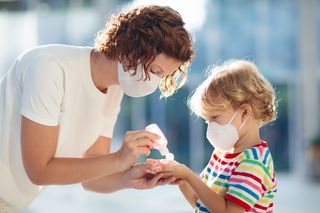Fear
Can You Be Abundantly Cautious, and Fearless?
Maintain your peace of mind as your take reasonable precautions.
Posted March 11, 2020 Reviewed by Gary Drevitch

Fear and caution tend to go hand-in-hand: The fearful are cautious, and the cautious are fearful. We assume that people who parachute out of airplanes are fearless, for example, and that the fearful stay safely in the plane (or on the ground).
In the current coronavirus crisis, the overlap between fear and caution may lead us to believe we have to choose one or the other. Should I be afraid and careful, or fearless and go about my business as usual?
But fear and caution are not the same thing. Many things can inspire caution, like care for others and a clear understanding of the facts at hand. On the other hand, a person can be terrified and careless—so afraid of the coronavirus that they give up and throw caution to the wind.
Nevertheless, it’s challenging to separate fear and caution, especially when there’s a good chance people will assume you’re afraid if you’re especially careful. As Sam Harris noted in a recent podcast (which I recommend), he was reluctant to pull his kids out of school because of his concern that others would think he was paranoid.
Even your own brain is going to infer that you should be afraid if you’re being abundantly cautious. It’s constantly watching what you’re doing, and making inferences based on what it observes. If your brain sees you washing your hands more than usual and practicing social distancing, it’s going to conclude that there must be something quite dangerous that you’re trying to avoid, and that you should feel anxious about it.
I emphasized fearlessness in a recent post, writing that we can embrace uncertainty about the coronavirus rather than making uncertainty a problem. At the same time, fearlessness is perfectly compatible with caution. By way of analogy, consider gun ranges, which I’ve visited from time to time. Those who frequent gun ranges are the least fearful people you’ll find when it comes to guns: They love guns, and are comfortable around them. At the same time, you won’t find a group that’s more careful in how they handle their weapons.
So while you’re releasing your fear about the potential impact of the coronavirus on you and those you love, take reasonable precautions. Those might look extreme, at least at this point in the course of the pandemic. For example, you might feel awkward about not shaking people’s hands, or pausing your morning trips to the gym. I plan to practice a version of social distancing in the coming weeks as we wait to see what will unfold.
If you’re worried that others might think you’re a coward because of the precautions you take, let go of that fear, as well. You’re the only one responsible for how you choose to respond to this crisis. If nothing else, console yourself that you’re doing your part to avoid spreading it to the most vulnerable among us.
And what to do about your brain’s inference that you should be afraid, when it sees you being careful to avoid contacting and spreading germs? Remind your brain of a few things:
- You don’t have ultimate control over what happens. Release any false sense of responsibility for your health and that of others. While you can lower the risk, what ultimately happens is not in your control.
- Caution doesn’t mean nonstop vigilance. Grant yourself permission to stop constantly monitoring the spread of the virus and checking for hourly updates. Consult reliable sources (such as the CDC website) to get the information you need, and then go about living your life as best you can.
- Life is about facing problems. The real story of your life isn’t about whether or not bad things happened to you. Rather, it’s about how you responded to the challenges you faced. This viral outbreak is one in a series of problems you’ll encounter. How do you want to have handled it?
And as always when you’re feeling overwhelmed by fear, keep breathing. The breath is always with you, from the moment you’re born till you close your eyes for the last time. Focusing attention on the breath is a reliable way to activate your parasympathetic nervous system, which calms the fight/flight/freeze response. Center your awareness on the sensations of the breath, for as long as you have it. I’ll be breathing with you.
For more information about preventing the spread of the coronavirus, visit this page of the CDC website.


